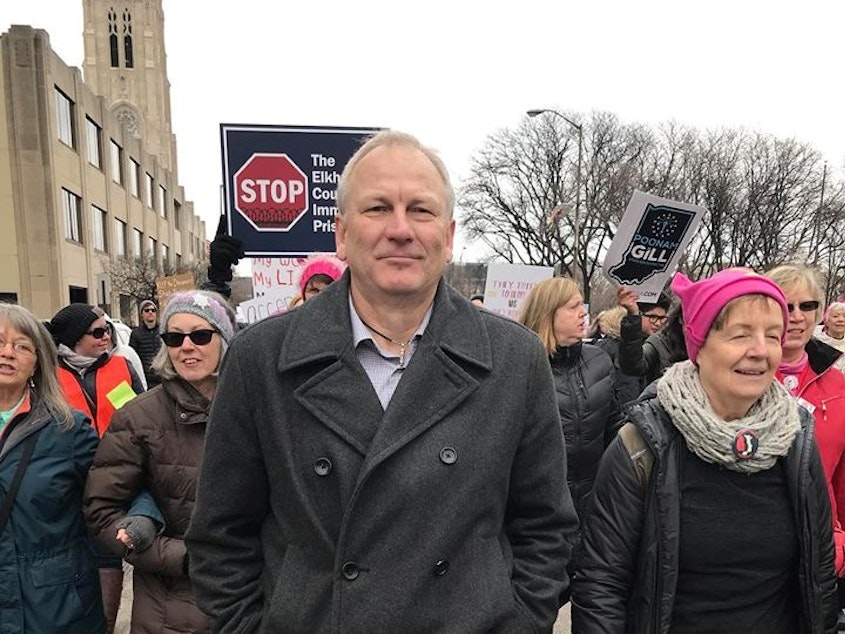My grandpa lost his girlfriend to cancer. He fights for Medicaid in her name

M
y grandpa, Steve Schoettmer, lost his girlfriend Rose to colon cancer in 2017.
In the past, his county's Democratic party had approached him about running for office, but he had refused. Rose was too ill.
But when he heard that Speaker Paul Ryan was threatening to cut Medicaid and Medicare, he decided that it was time for him to run.
My grandpa lives in Elizabethtown, Indiana, and he ran for Indiana House District 69 in the 2018 midterm elections. No one was surprised when he announced his candidacy. He's been an active union man his whole life, and he likes the sound of his own voice.
My grandpa has been telling a single story to unite people across his county: the story of his sweetie, Rose, and her struggle with cancer. She was the love of his life.
I used to live in Indiana, so I know that the state has a vast array of people. My grandpa talked to everyone he could.
He told me about this one guy – skinny and tattooed with a Confederate flag hanging on his wall. He had become disabled, which halted his career as a truck driver. He told my grandpa he would vote for him, took a yard sign, and put it in his yard.
“I went to the very next trailer,” my grandpa told me. “It was two DACA recipients. Told my story, the same story. They took a sign and put it in their yard, right next to the Confederate flag white guy with the tattoos.”
Sponsored
He talked to all of them about Rose and why he was running for state office.
Rose was like a grandma to me, but I remember her in fragments. I didn’t see her much, since I was living in Oklahoma and Seattle. I know she loved to paint, especially flowers.
I think that Rose was in the room the first time my grandpa tried to teach me guitar. He had played on and off for his whole life, but he picked it up again when Rose’s cancer got really bad.
I remember the time I rode next to Rose in the back of a minivan, driving down a hot Oklahoma back road, windows down, the air blowing thick and loud. She was smiling.

Sponsored
When she was diagnosed, I was too young to understand what was going on. But when I asked my grandpa about why he was running for office in her name, he told me that medical bills are expensive.
“Her biggest fear,” my grandpa said, “was that they kept on trying to repeal the Medicaid expansion in Congress. In fact, they voted to just flat out repeal it.”
Fortunately for Rose, she never lost her insurance. She went on clinical trials for a while before entering home hospice under my grandpa’s care.
After her diagnosis, she was given three to five years to live. She lived for seven.
Sponsored
My grandpa didn't want to run for office when Rose was still alive because he was focused on taking care of her. But after she passed, Congress did something that changed his mind: “I was listening to the Republicans pass that big tax cut in 2017 in December, and Paul Ryan was so elated. He goes, ‘Next year, we’re going after Medicaid and Medicare,’ and that just went through me. It just ignited me.”
My grandpa knocked on doors across his county, sharing Rose’s story. But he shared the condensed version. None of these strangers heard the real brutality of what happened. “She was losing motor skills,” he said, “and losing conscious control. But she still wanted to do things. She stopped working because she had to, not because she wanted to. That’s the face of Medicaid.”
But, to my grandpa, Rose is so much more than a clever campaign strategy.
“When I use her memory, what I’m doing is I’m still protecting her,” he said. “You know, she’s not the only Rose out there.”
Sponsored
Rose was one of the lucky ones. She didn't lose her Medicaid benefits. But my grandpa told me that this isn't true for everyone he meets. My grandpa doesn’t want to see anyone else afraid, like Rose was.
If you ask him why he ran, he’ll almost certainly say, “for my sweetie.”
My grandpa didn't win the election, and he's still deciding if he will run again. For now, he’s focused on taking care of his goats. He set up an altar for Rose, and he drinks green tea with her there every morning.
This story was created in KUOW's RadioActive Intro to Journalism Workshop for 15- to 18-year-olds at Jack Straw Cultural Center, with production support from Andrew Stuckey. Edited by Ruby de Luna.
Find RadioActive on Facebook, Twitter and Instagram, and on the RadioActive podcast.



